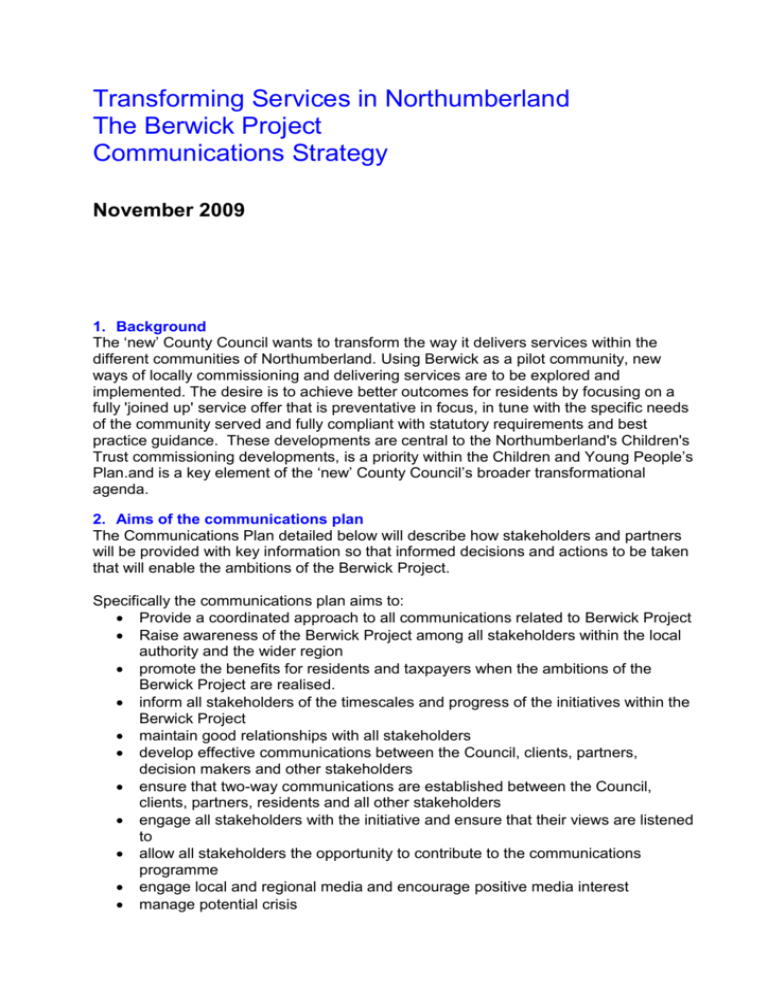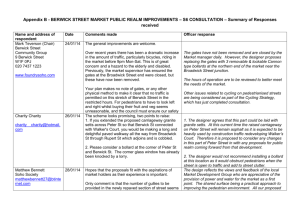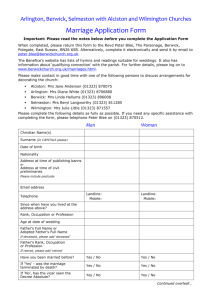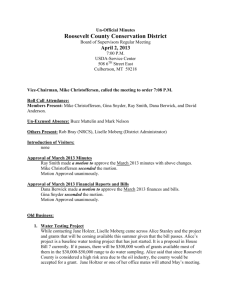Direct Communication - Northumberland County Council
advertisement

Transforming Services in Northumberland The Berwick Project Communications Strategy November 2009 1. Background The ‘new’ County Council wants to transform the way it delivers services within the different communities of Northumberland. Using Berwick as a pilot community, new ways of locally commissioning and delivering services are to be explored and implemented. The desire is to achieve better outcomes for residents by focusing on a fully 'joined up' service offer that is preventative in focus, in tune with the specific needs of the community served and fully compliant with statutory requirements and best practice guidance. These developments are central to the Northumberland's Children's Trust commissioning developments, is a priority within the Children and Young People’s Plan.and is a key element of the ‘new’ County Council’s broader transformational agenda. 2. Aims of the communications plan The Communications Plan detailed below will describe how stakeholders and partners will be provided with key information so that informed decisions and actions to be taken that will enable the ambitions of the Berwick Project. Specifically the communications plan aims to: Provide a coordinated approach to all communications related to Berwick Project Raise awareness of the Berwick Project among all stakeholders within the local authority and the wider region promote the benefits for residents and taxpayers when the ambitions of the Berwick Project are realised. inform all stakeholders of the timescales and progress of the initiatives within the Berwick Project maintain good relationships with all stakeholders develop effective communications between the Council, clients, partners, decision makers and other stakeholders ensure that two-way communications are established between the Council, clients, partners, residents and all other stakeholders engage all stakeholders with the initiative and ensure that their views are listened to allow all stakeholders the opportunity to contribute to the communications programme engage local and regional media and encourage positive media interest manage potential crisis use existing communications channels and develop new ones to achieve communications goals Make key messages more easily understood by using jargon-free language The communications plan will support this aim through: Providing accurate, relevant, timely and clear information for all stakeholders Developing an understanding between the Council and its public of the scale of the project and its aims and objectives Advising stakeholders about benefits to them of the Berwick Project Using effective media to reach the target audience Launching a publicity campaign Managing media enquiries and the flow of information corporately Managing potential crisis Making the best use of available resources Taking advantage of any opportunity that arise to promote Berwick Project Informing all NCC employees on a continuous basis to ensure employee awareness and understanding Regular review and overhaul in light of changing needs and priorities. 3. Target audience While focussed initially in Berwick the target audience extends across the County beyond. It will potentially include all of the County’s residents, all employees of the ‘new’ County Council, members of partner and stakeholder organisations and regional and national bodies such as Government Office North East (GONE) and the Department for Children, School and Families (DCSF).. The audience forms three groups: 1. Those people who are actively involved with the Berwick Project: Local Residents, Parents and Carers Children and Young People Extended Family Members NCC employees (the centre’s project team - the X-Team) NCC Members Members of the Berwick Headteacher’s Partnership and School Staff Members of Berwick’s Integrated Team, Extended Services Members of centrally delivered services who work into Berwick 2. Those people who are not actively involved with the project but who need to be engaged with: All NCC employees Local residents The local/regional news media 3. Those people who do not have to be engaged specifically, but it would benefit the reputation of the Council and the project to keep them well informed MP and MEP Local Government and professional media Central Government Bodies such as DCSF Regional Bodies such as GONE 3. Information/communication needs of target audience Each group will be provided with information about and/or the need to be engaged with the Berwick Project. Given the complexity and scope of the project’s remit the need to shape information in such a way that is in tune with the specific requirements of each group is essential The goals of this communication plan are to ensure that members of the three groups listed above have access to information that, for the Berwick Project promotes: Awareness: communication activity necessary to impart a general overview of the Berwick Project its aims and objectives and timescales. This will allow the target audience to be introduced to the ‘Berwick Project’. Engagement – communication activity that enables the target audience to be able to find out more about the Berwick Project and to share their views Involvement and Participation: communication activity that enables the target audience to be able to be involved directly and/or participate in shaping solutions and ways forward Feedback: communication and marketing activity to demonstrate the effectiveness of engagement and participation this will be realised when there is ‘buy-in’ to the Project. Buy-in will be realised when those who are aware of or are involved directly can define the merits of the scheme and why they choose to remain involved. 4. Timing of communication Communications relating to the launch of the project Communication activity has already commenced. Those directly involved in the project in Berwick meet regularly and receive regular briefings and updates regarding progress of the projects activities and desired outcomes. This activity has been augmented by briefings and updates provided to parent carer and professional forums, service managers groups and members of partner organisations such as Community Health. Until this point in time this level of communication has been considered to be adequate. However with the acceptance of the Berwick Project into the County’s Forward Plan there is now a need to formalise the arrangements and initiate the Communication Plan. A launch event is envisaged. However the launch will only take place once the Project is embedded in the strategic planning processes and those who are currently becoming directly involved are fully aware of the scope and ambition of the enterprise. A launch is tentatively planned for March 2010. However there is a clear need to begin formal exchanges of information, awareness raising and engagement with several key audiences immediately. General communications activity Commencing December 2009 employees of the ‘new’ County Council will be introduced to the Berwick Project. This will be achieved through the regular ‘Update’ briefings available to all employed by the ‘new’ County Council. This information will be included in or through The County’s FACTSHEET – available to all family focussed services and teams within the ‘new’ County Council and Partner Agencies Parent and Carer Newsletters ‘e-courier’ letters to Headteachers School Governor Briefing Packs the County Website Regional Hub and RIEP Briefings Bids for innovations grant forwarded to DCLG DCSF briefing events and background information sent prior to inspection visits As the emphasis moves towards Engagement, Involvement/Participation and Feedback the following approaches and techniques will be employed X-Team Meetings Employee and Stakeholder Seminars Stakeholder Events Conferences Further an outcome of the Berwick Project will be the development of a Community Participation Strategy – a key element of which will be a local Communications Plan 5. Key Messages At this point in time the key messages to be communicated regarding the Berwick Project are focussed on the Purpose, Aims, Means and Actions. The current focus is on Awareness raising however as the Project develops the emphasis will move more towards Engagement, Participation and Feedback. Current Key Messages Purpose • The purpose of the Berwick Project is to – explore and then define how services can be transformed so that…. – residents have rapid access to and confidence in community based and locally commissioned services that are… – preventative in focus, coordinated, consistent, holistic, client focused and have the… – required capacities and capabilities to deliver effectively and efficiently. Aims • Deliver transformed services that enable better outcomes for all Children and Young People, Families and Households – while… • Using tax payers money more effectively and efficiently – while… • Delivering within a wide range of (apparently discrete) government driven initiatives • – e.g. ‘Aiming Higher’, ‘DCATCH’, ‘Think Family’, ‘Raising the Bar Narrowing the Gap’, ‘Overcoming Childhood Poverty’, ‘Care Matters’, TaMHS. – e.g. ‘Improving Mental Health and Psychological Well-being’, ‘Reducing Reliance on Alcohol’, ‘Community Cohesion’, ‘Community Participation’, ‘Equalities and Diversity Agenda’, ‘Reducing Teenage Pregnancies’, ‘Reducing number of ‘Out-County’ Placements’. – e.g. ‘Improving Neighbourhood Services’, ‘Community Transport’, ‘Reducing our Carbon Footprint’ etc etc i.e. Ensuring all our local services join up Means and Actions • The Project’s Aims will be achieved through the initiation of an increasing number of sets of coordinated inter-service and departmental actions • Evaluation will take place to – ensure improving satisfaction with services, outcomes are improving, the offer is integrated and coordinated and tax payers money is being used more effectively and efficiently These messages will need to be updated as the Berwick Project progresses. The Communication Plan will be updated accordingly. 6. Key Milestones Key milestones are currently been confirmed as part of the Project Initiation Document (PID) Development. These particularly relate to the delivery of key outputs. As these outputs are delivered it is planned to disseminate and celebrate delivery. Dates of key milestones will be confirmed when the PID has been ratified. 7. Communications needs – delivery Responsibility o The Project Manager (John Kirton) will be responsible for the effective delivery of the communications strategy – specifically that the target audience are Aware of… Engaged with… Participate in… and provide Feedback to…The Berwick Project. o The Project’s Executive Team will oversee and support the delivery of the Communication Strategy on a countywide, regional and national basis o The Berwick Core Group will oversee and support the delivery of the Communication Strategy within the Berwick Community Key Milestones o The Executive and Core Groups will confirm the need for Key Milestone events and the media through which key messages will disseminate and the methodology to be used. Contact details of the Project Manager, Executive Group and Core group are shown in Appendix 1 o Regular updates on progress will be provided at monthly meetings of the Executive and Core Groups when decisions will be taken about the next steps to be taken to continue on-going and effective communication with the target audience Designated spokes people for the media and their contact details are listed in Appendix 2 Feedback and Evaluation o Feedback and evaluation mechanisms to monitor perceptions of partners and residents are being developed as an integral part of the Project Plan. 8. Communications Tools In addition to the internal mechanisms and vehicles that enable effective communication (see above - 4 General Communication Activity) external mechanisms and media outlets will be approached and used as needs demand. Of particular importance and relevance will be: Press Berwick Advertiser Other Northumberland Newspapers Scottish Borders Newspapers Journal and Evening Chronicle Broadcast Media BBC Radio Newcastle; Border/Tyne Tees Television; BBC Local Television Direct Communication NCC’s residents’ magazine Northumberland News Electronic Communications NCC website; Websites of all partnership organisations. NCC intranet and partnership intranets; email Face-to-face Consultation events; road shows; meetings with stakeholders; news briefings Displays & Printed Literature Opportunities range from the publication of newsletters to specific groups to exhibitions in public buildings or at sites within the town centre. 9. Branding Berwick Project is an NCC initiative therefore the NCC brand will be applied to all Berwick Project communications. The importance of residents, stakeholders and partners being aware that the Berwick Project is being championed and enabled by NCC is recognised. It is also recognised that as the Project develops it may be necessary to consider how to brand solutions where greater autonomy may be given to the Berwick Community itself to commission its own solutions 10 Spokespeople List those people who will be the official spokespeople for this initiative are listed in Appendix 3 11. Communication Methods This communications plan is aimed at a diverse audience and at three specific audience groups. (See Target Audience). It is understood that people receive and take in information in different ways and as such a ‘one size fits all’ approach to ‘communication’ will not be adopted. A variety of targeted communications methods needs to be considered to raise awareness, disseminate information and engage residents, partners and stakeholders. The following list is not exhaustive Target audience Project steering group NCC Communication/information need Awareness Engagement/Involvement Feedback Awareness Frequency Communications channels As required Meetings/email As Meetings/email/website Members Engagement/Involvement Feedback Headteachers Awareness Engagement/Involvement Feedback Schools Awareness Engagement/Involvement Feedback Parents Awareness Engagement/Involvement Feedback NCC Awareness employees Engagement/ Feedback Northumberland Awareness residents Engagement/ Feedback News media Awareness Engagement/Feedback MP/MEP Awareness/Feedback Local govt. and professional media Awareness required As required Meetings/email/intranet/website As required Meetings/email/Town Crier/media/events As required Meetings/website/SMS texting/events As required Meetings/email/intranet/website On going Northumberland News/media/website/meetings As required As required As required Briefings/news releases/email/telephone/website Meetings/media/email/website News releases/NCC website 12. Considerations Budget and Resources/People As part of the PID confirmation the budget resources/people available for the delivery of the key elements of the Communication Strategy will be defined. The budget will be required to enable o Newsletters o Conferences o Seminars o Briefings o Launch Events Timescales Effective communications will be a critical element to the success of the project. Sufficient time for planning and implementing specific elements of this communication plan will be provided. Communication will be a standing item on the agendas of the Executive and Core Groups Partners This Communication Plan and Strategy will be ratified by the Executive and Core groups 13. Evaluation -success measures/targets Press Press support Feedback Public response to events and comments afterwards General support from residents Surveys - residents/partners/schools Positive comments from NCC employees 14. Recommendations A member of the Communications Team is part of the County’s X-Team Communications Strategy appears as a standing item on the agendas of the Berwick and the County’s X-Team discussions






